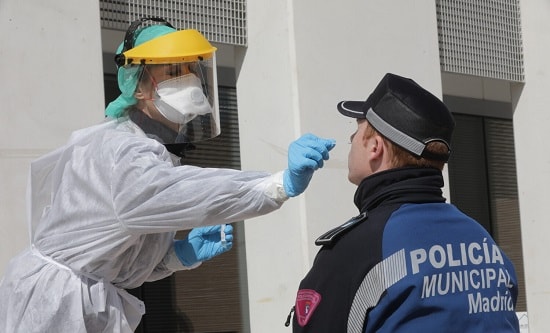
On 13 March, the Spanish government declared a ‘State of Alert’ – just one step below a state of emergency. This has only happened once before, during an air traffic controllers’ strike in December 2010. Schools had already closed on 11 March and following the decree all public events were cancelled and venues closed. However, the quarantine could not prevent the number of victims of Covid-19 from rising sharply and within two weeks hospitals were on the verge of collapse. The crisis is exposing the weakness of a system that has allowed 24% of the country’s health care budget to be managed by private companies, mostly in the hands of hedge funds. JUANJO RIVAS reports from Madrid.
On 7 January, the first coalition government in Spain was formed after a tight vote in parliament, with 16 MPs in favour and 165 against. Pedro Sánchez, the leader of the social democrats (PSOE) was sworn in with the votes of Podemos and some nationalist organisations. PSOE and Podemos reached an agreement on a social agenda, which includes a commitment to revoke the most recent labour market reforms and to establish alternatives to evictions. Right-wing liberals and far-right parties wasted no time in undermining the cabinet, labelling Sánchez a puppet of ‘communists’, ‘radical feminists’ and ‘Catalan separatists’. Only two months after the formation of the cabinet, all economic and social plans were postponed because of the Covid-19 crisis.
The Covid-19 pandemic has shown starkly the shortage of beds and resources in the Spanish health service. This is the result of the austerity policies applied by the conservatives since 2005. Politicians deliberately imposed cuts and disinvestment to pave the way for private companies to consolidate their position in the public health care system. Conservatives in Madrid developed a model based on 30-year mortgages to build seven new hospitals with private management. With this model, the final cost triples the real cost of production. All non-health care services (cleaning, food selling, security, cafés etc) were offered to these companies, also on the basis of a 30-year concession. The municipality of Madrid is an example of the result of 25 years of conservative and pro-austerity rule: 2,966 hospital beds lost, 3,207 fewer professional medical staff, the closure of some wings in public hospitals and public funding 14% below the national average.
In 2011, in the middle of the economic recession, the Spanish health service continued to face cuts in budgets and provision of services. However, the private companies involved increased their profits by 40%. It is no coincidence that these same private companies funded the campaigns of the conservative People’s Party, through networks of corruption.
As the Covid-19 crisis has deepened, the death toll has soared, with more than 4,000 fatalities recorded by 25 March, a third of them in Madrid. Hospitals are overflowing, undertakers cannot cope and large public venues have begun to be turned into shelters for homeless people, field hospitals and morgues. As we go to press, crematoriums in Madrid have reached saturation point and corpses are having to be transported to other provinces for incineration.
Almost 15% of Spain’s confirmed cases of coronavirus – which had reached nearly 66,000 as we go to press – have been health workers. In Madrid and other regions, stocks of basic protective equipment such as face masks are running so low that medical staff are having to reuse items.
In the midst of the lockdown, details emerged about the secret foreign accounts owned by former King Juan Carlos. His son was forced to distance himself from the scandal by rejecting his inheritance. His message was broadcast to the nation on 18 March. He attempted to offer words of comfort to the population, but every major town saw hundreds of thousands come out onto their balconies to angrily bang pots and pans as a sign of their rejection of the corrupt monarchy.
On 22 March, the first shipment of aid from China arrived. It is worth mentioning that Chinese businesses had closed before the State of Alert was declared and Chinese entrepreneurs in Spain turned up at hospitals and police stations to donate all their stocks of masks, gloves and sanitary material. At the end of March, Spain is also to receive a Cuban delegation formed by 52 doctors. This is an outstanding expression of international solidarity, which shows the commitment of the Cuban revolution to the wellbeing of humanity.
But the handling of the crisis has a distinctive class character. While the working class is hit hard, the military are being given a prominent role. UN reports on Spain show that 26.1% of the people are at risk of poverty and it is the third most unequal country in the European Union, after Bulgaria and Lithuania. As a result of the lockdown, over one million people have been temporarily laid off, relying on getting their jobs back or depending on state subsidies. Military Chief Commanders are present in every press conference, popularising the use of war-related terms and threatening those who do not comply with police requests with prison. In fact, just 12 days after the State of Alert was declared, 102,000 fines had already been issued and 926 people arrested. There are countless reports of police abuse and the illegal use of force against citizens. Meanwhile, the extreme-right has found an opportunity to spread its racist and sexist rhetoric, blaming the government for allowing the Women’s Day protest and demanding that free health care should be only provided to nationals.
While the lockdown has placed radical street organisation on a temporary hold across the country, the economic and political faultlines that underpin Spanish society have not disappeared. As the immediate devastation of the pandemic begins to subside, however long it may take, working class resistance will once again emerge to challenge the inequalities of an authoritarian and corrupt state.
Fight Racism! Fight Imperialism! No 275, March/April 2020




